National Award winning filmmaker, Sanju Surendran's debut feature film, Aedan - Garden of Desire, won two prizes at International Film Festival of Kerala (IFFK) - The FIPRESCI prize for Best Malayalam Film and the Rajathachakoram (Silver Crow Pheasant) for the Best Debut Director. Based on S Hareesh's short stories, his movie also received a positive response from the critics.
... fiction itself has an element of reality to it. At the same time when it comes to making a documentary, it needs to be polished with certain elements of fiction as well.
The film has all the elements of reality, revolving around the closed intensity that both life and death exist upon. On being questioned about the title of the film, he happily answers that Aedan is a Biblical metaphor, in the disposition that they were mapping a landscape of certain human emotions and human passions and its unpredictability. It was like creating a land where death and life play two central themes. These themes may seem opposite objectively, but they're interconnected. The death of something also marks the beginning of something else. Without a doubt, the film's realistic approach is what you'll take along after the movie ends.
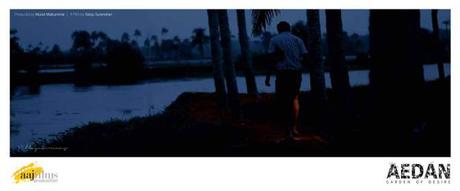
Even though his documentary 'Kapila' won a national and an international award, the humble director had no arrogance in him. Ten years after Sanju graduated from FTII, Pune, ' Aedan' was finally made. He acknowledges that the support for his batchmates and friends from the institute was a tremendous contribution. "It's been a very long journey in the process of making my first feature film. Before this, I made many short films and documentaries. Since 'Kapila' was well-received, that worked as a catalyst for the whole team who ignited immense willpower to make a feature film. And that's how Aedan happened. And we also had a wonderful producer, Mattummal Murali, who was a positive support to all of us. He is very creative so we could do the film exactly the way we wanted to, without any compromise. "
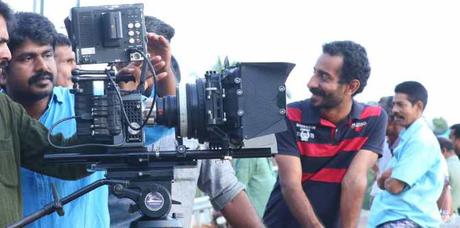
We were curious to know more about the film, so without any hesitation, he added, " Aedan means garden of desire. In English, it is spelt as Eden and it is a biblical metaphor. It was very interesting the way the title evolved. First, we had used Night Travel for the film. But in the scripting stages itself, the characters were mapping a landscape of real human emotions and genuine human passion and its unpredictability. It felt like we were creating a land of its own. After the shooting of the film and working on the edits, we came up with the title Aedan which one of my poet friends suggested. I felt that death and life were two central themes in the movie. So these may seem like two opposite things, but they're very interconnected. Even the stories in the film are trying to unveil the very complicated life."

"One of my stories which is based on reality portrays a nurse. The story is about the time when her father died in Bangalore so she had to bring her father's dead body from Bangalore to Kottayam, Kerela. On the way, she falls in love with her friend. So everything is interconnected. When something ends, something starts. The film is based on real-life incidences, and it will be of complete justice if I say that reality is stranger than fiction. "
Cinema is a very deceptive artform in the sense that people think it is very easy to make films or to understand films. But I feel there should be a constant effort to analyse films... if you want to play the guitar, you have to learn how to play it. You have to keep practising it. You have to dedicate time and that's the only way. Same thing with cinema. You have to understand cinema and it is a lifelong process. It's not an instantaneous thing.
When asked whether he enjoyed fiction or non-fiction, and his preferences he replied, "I never felt like I had to choose. When I made Kapila, It consisted of certain elements of documentary and certain elements of fiction. But the bigger picture has always been cinema. We saw Aedan as a cinematographic work at the end of the day. All these are various exercises in cinema. Attempts at the cinema. I want to make cinema. When you're trying to make a documentary, make it like you're making a fiction film. And when you're trying to make a fiction film, try to make it like a documentary."
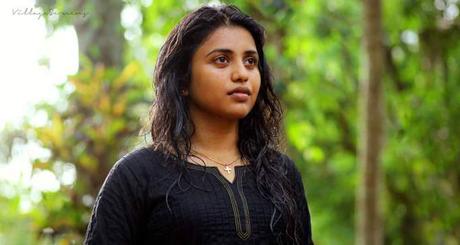
The talented director stressed on the fact that fiction itself has an element of reality to it. At the same time when it comes to making a documentary, it needs to be polished with certain elements of fiction as well.
According to him, the sounds in the movie are of the essence. He wanted to make sure that the ambient polyphony transforms into music. He adds, "In films, the noise transforms into music. So the soundtrack feels like a musical track. We actually didn't use any musical score but it was primarily the ambient sounds that created music. A lot of people worked really hard in the sound department.
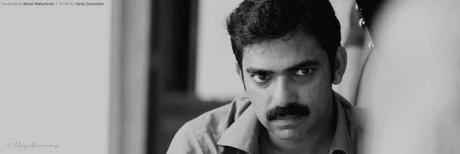
The director was all in praise of legendary filmmaker, Mani Kaul.
"The most special thing about college was Mani Kaul who came to India after a long time and his workshop was wonderful. He spent about one month with us and he taught us priceless things about cinema. He taught things that cannot be learnt. He opened our ears to unknown rhythms. He made us see what cannot be seen. He sparked off a thousand new cinemas. It was like a moment of enlightenment because he knew the crux of films. What makes cinema a cinema. What makes a painting a painting. There are very few filmmakers that have such an understanding of cinema. That helped us all as a batch in our understanding of life and of cinema. "
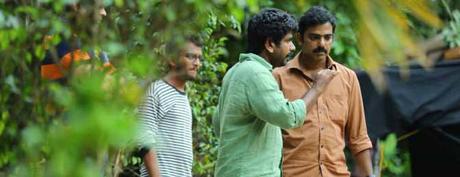
"FTII was a wonderful experience because it allows us to experiment. It allows us to fail. There are very few places that allow us to fail. Many places will give you an opportunity to succeed and to win. But FTII to a filmmaker is very important. Because you try, you learn, you rectify and you change, there is always potential. FTII made me find my space as a filmmaker. I spent about 3-4 years in the institute. We had a wonderful library, and the screenings used to take place so that we could watch films and analyse them. We had various projects for each year. Each project would be an attempt to understand cinema. All of them were different journeys in our very understanding of cinema our own realization of self."

"Cinema is a very deceptive artform in the sense that people think it is very easy to make films or to understand films. But I feel there should be a constant effort to analyse films. It always opens up new possibilities and newer challenges to your ideas and perspectives. I'll give you a simple analogy, if you want to play the guitar, you have to learn how to play it. You have to keep practising it. You have to dedicate time and that's the only way. Same thing with cinema. You have to understand cinema and it is a lifelong process. It's not an instantaneous thing. We have to explore, have to challenge ourselves. Try to watch all kinds of cinema. Try to read new books. Always have a perspective."
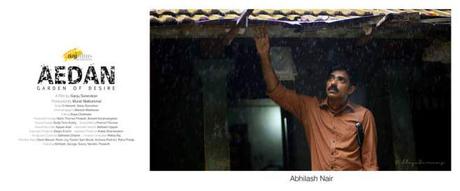
Related
